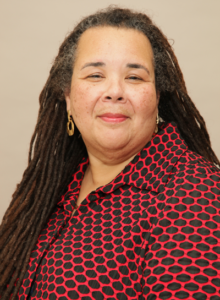
Bootstraps in Classrooms: Dissuading Rugged Individualism
Exposing and disrupting the values which perpetuate white normativity puts a strain on the adult classroom. Individualism is a cornerstone value of whiteness and patriarchy. As persons committed to the flimsy lie of pulling oneself up by the bootstraps, too many students believe that education is best attempted alone. Conforming to the principles and practices of individualism, adult students believe that by leaving the people who formed and shaped them they can better demonstrate excellence. By denouncing accountability to and responsibility for their people, their kin, and their community, they are becoming good U.S. citizens. “To thine own self be true” is exaggerated to narcissism, isolation, and dangerous detachment. The racist values of this U.S. society teach that in order to be real you must be alone.
Equally, the U.S. educational system functions to uphold the societal tenants of individualism. Higher education rewards individualism. My teaching colleagues were told that the only way to make a legitimate contribution to their scholarly field of study was to do it alone. Collaboration is cheating! We are discouraged from playing well with one another. Consequently, teachers typically insist upon and praise individualism in adult classrooms.

Even for students who understand themselves to be part of a community and enabled by the sacrifices of others, adult classrooms are places of disorientation. The new perspectives, new expectations, new experiences, and new ideas challenge even the most prepared, supported and grounded student. For the student who presumes that individualism is the best way to approach study, the disorientation can become severe and can make learning terrifying. The hardcore pledge to individualism which is a hallmark of U.S. society and the academy only serves to exacerbate the student’s anxieties.
Further confusing to the adult student steeped in the delusion of individualism is the classroom that values partnership, cooperation, and collaboration. Group assignments and shared projects that are designed as counterpoints or correctives to society’s hegemonic imagination dumbfound the student who believes the better way is the autonomous way. I have actually heard loud and painful groans when students, upon reading my syllabus, understand that group work is part of the course experience.
Students who believe their work is best showcased in isolation resist and refuse to work on group projects. On more than one occasion, I have had to disband fighting groups. On a few occasions, groups were crippled by the logistics of when and how to meet. Repeatedly, groups will do tandem reports with each person giving individual speeches rather than working for a synergized, harmonized product. In several instances, I am certain that groups relinquished power to one student who then did most, if not all, of the work. In all of these situations, my hunch is that those students who saw no pedagogical value in collaboration sabotaged the groups. When self-reliance eclipses a sense of community, belonging, and mutuality or when self-reliance is at the expense of communal care and responsibility, then classroom spaces that affirm values of mutuality and teamwork become experiences of deep pain and confounding for the students – and the teacher.
I want my students to become aware that knowing is communal and that learning is relational. Individual knowledge is a fallacy. How we make meaning depends upon the context(s) in which we find ourselves. Who we are and whose we are has direct bearing upon how we learn as well as the measure and merit of learning. Knowing and knowing better requires awareness of relationships. Individualism limits, constrains, and distorts efforts to know beyond yourself.

I have over the years developed strategies to signal to students that their connection to their people while learning is paramount and that my classroom is a place to develop skills for collaboration, partnership and cooperation. The exercises are not meant to instantly dissuade students of individualism as a core value. They are meant as moments to consider that there are other, maybe more generative, values to hold dear while learning and living.
One of my learning activities is a ritual of invocation. Early in the semester I ask students to consider persons, living or dead, who would be glad they are enrolled in my class. I tell them to think about persons who would support them in school when things get difficult or persons who have their best interest at heart as they move through coursework. When students are ready, I ask that each student in-turn speak aloud the full name of one of the persons. I instruct students, saying one name per turn, to exhaust their list of persons. Once all the names have been spoken, I acknowledge the ancestral and communal love in the room. This conjuring often sustains us.
Another exercise is a reflection activity. I give students time to think through their answers, then instruct them to write their answers as succinct lists on the blackboard:
- Who are your people (describe in race, class, gender and other social location indicators)? To whom are you accountable while in this degree program? Who is praying for you while you are here? Who do you struggle not to disappoint as you study?
- What highest job of leadership will be afforded you once you have demonstrated reasonable mastery?
- What is the suffering of your people? What are their vulnerabilities? What is their trouble?
- Which aspects of their suffering and anguish will you bring to bear upon the conversations in this course? How will you work so that with the taking of this degree you are more informed about the needs of your people?
- During your studies for which systemic oppression will you become expert for the healing of your people?
These kinds of learning exercises help reconnect and remind us we are not alone. At least they help me. Each time I do an exercise of this kind, I name my own ancestors and our troubles. I, too, am reminded that I do not teach alone and that I do not teach in vain.
Leave a Reply